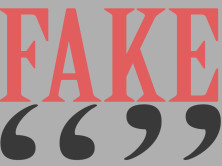
(Credit: Wikipedia/Espen Moe)
McClatchy’s Seibel denied changing Times content when asked about Chu’s comments, and argued:
“The Times later revised the story, added additional material, and added Janet Stobart to the byline. That’s the version that appeared in their newspaper and is on their website now. It too was available via MCT, hours after the first version moved. It’s the one Henry is citing. It did not move as a correction.”
In an earlier phone call with iMediaEthics, Seibel had said:
“We delete paragraphs, we excise sentences, we change words all the time. That’s with any wire story. And you know I’m not going to hassle the L.A. Times about a correction of something that in our opinion was clearly incorrectly phrased and, uh, I mean, these stories are like a year and a half old or more, I think.”

The graphic above illustrates the complexity of getting a corrections of the public record of an error in the LA Times alone. (Credit: Alberto Mena, NOTE: please feel free to reproduce with credit to iMediaEthics & Mena). Please click graphic to enlarge.
The Charlotte Observer: “No, That would not be routine”
One of The Charlotte Observer’s articles (“Bank of America Wonders About WikiLeaks’ Planned ‘Megaleak,’” Dec. 21, 2010) was corrected by McClatchy. McClatchy’s correction, posted here on its publication of the article, reads: “CORRECTION: An earlier version of this story incorrectly stated in the above paragraph that Assange was battling ‘sexual assault charges.’ Assange has not been charged in Sweden.”

The Charlotte Observer also has a prominent online correction page. See screen shot above. (Credit: The Charlotte Observer)
The article is not available on The Observer’s website anymore; a link to the story re-directs to a page not found. The Charlotte Observer’s editor, Rick Thames, told us “we will need to correct” the error and that “I don’t think that would be routine” for McClatchy to correct a published story without notifying the news organization. Thames, who spoke with Seibel after we contacted him, said:
“He does understand that the best way would be to contact us. I think that in any circumstance, if you are aware of a story that has an error in it, that it would behoove you to go back to the originating site and in this case, it was Charlotte Observer and let whoever that is … know that there’s an error in that story.”
The article is re-published on the website of The Wichita Eagle, another McClatchy-owned newspaper. We contacted the Eagle to ask whether it will be posting a correction and to confirm that it never received a correction alert from McClatchy. Deputy editor Michael Roehrman wrote to iMediaEthics by email:
“After looking into this, and considering the amount of time since it was published, I have nothing to add and no further comment.”
Apparently, if an error isn’t brand new, The Wichita Eagle doesn’t correct for its readers. Future historians would do well to source elsewhere. Interestingly, after we contacted the Eagle, their publication of the report mysteriously disappeared. Guess it’s a good thing we saved the page last week. See here.
The Sacramento Bee Adds a Correction
The Sacramento Bee’s Dec. 2, 2010 article “Feinstein Calls for Spy Charge” was corrected by McClatchy as well. The correction, posted on the McClatchy re-publication of the article, reads: “CORRECTION: An earlier version of this story incorrectly stated that Assange faced sexual assault charges in Sweden. Assange has not been charged with a crime.”
Yet the correction was not posted with The Bee‘s story until iMediaEthics contacted the newspaper. The story’s author, Foon Rhee, wrote in an email to iMediaEthics on June 26 that he posted a correction to the blog. “This was the first we had heard about this situation,” he wrote. “I’m not in a position to address your other queries.”

The Sacramento Bee has a prominent online correction page (Credit: The Sacramento Bee)
The correction, posted June 26 on The Sacramento Bee, reads:
“CORRECTION: An earlier version of this blog item incorrectly stated that Assange faced sexual assault charges in Sweden. Assange has not been charged with a crime.”
McClatchy’s Stories’ Corrections
The two McClatchy corrected articles and their corrections:
1. “WikiLeaks: Swiss bank freezes Julian Assange’s account” by Mark Seibel, Dec. 6, 2010. CORRECTION: An earlier version of this story incorrected referred to “sex-related charges” in Paragraph 6. Assange has not been charged with a crime in Sweden.
2. “Officials May Be Overstating the Danger from WikiLeaks” by Nancy A. Youssef, Nov. 28, 2010. CORRECTION: An earlier version of this story incorrectly stated in the 12th paragraph that Assange is facing rape charges. No charges have been filed against him in Sweden.
Corrections are not published on news archive databases LexisNexis and Newsbank, where the uncorrected articles appear. Seibel added about McClatchy’s corrections on Assange: “What I’m trying to make clear to you is that he asked us to correct something on our website. We did it.”
McClatchy’s Seibel: “What’s the Difference between Charges and Allegations?”
iMediaEthics spoke at length with McClatchy’s Seibel about the errors, and the failure to inform The Miami Herald, The Charlotte Observer, the Los Angeles Times and The Sacramento Bee of content changes.
Seibel called the errors an “awareness error” and a “wording” issue. “When you know there’s a hair to be split there, just split it in terms of allegations, everybody is happy and the story is equally accurate as it ever was,” he said. “That was the point.” Later he added, “Frankly, to me, it’s not that big a deal. It’s a correction.”
Big deal or not, news outlets didn’t know.
Seibel denied responsibility for letting newspapers know about the corrections, a task he identified as “really Assange’s responsibility” and also the individual newspapers’ responsibility. “We’re responsible for what’s on our site,” he said. “We’re not responsible for what the L.A. Times publishes.”
On the other hand, he called The Miami Herald “blameless” for not running a print correction until iMediaEthics contacted it, because “they didn’t know that there was something to be corrected because the way it was being reviewed.”
Want a couple of more reasons for why The Herald and others were left in the dark about changes to their own content?
Seibel said that McClatchy fulfilled its role in correcting content on its website. “[Assange] asks us to correct something on the website, so we corrected something on our website, which is what we publish,” he said. “We don’t have a newspaper, and I’m assuming if his bot had detected it on other websites, it would ask them or corrections on their websites. I’m assuming we’re not the only people in the world he’s asked this correction of.”
Disclosure: Sydney Smith, co-author of this report, had a college internship on the copy-editing desk of McClatchy-owned newspaper The State in 2007.
UPDATE: 6/27/2012 2:53 PM EST: Added these sentences: Interestingly, after we contacted the Eagle, their publication of the report mysteriously disappeared. Guess it’s a good thing we saved the page last week. See here.
UPDATE: 6/27/2012 4:20 PM EST:
We’ve heard updates from both the Charlotte Observer and the Miami Herald.
The Charlotte Observer’s editor Rick Thames told us by phone that “Yes, we are going to correct our story over the wire. We do it [such corrections and updates] on a routine basis. ”
The Miami Herald’s Jay Ducassi said by e-mail:
“We did let the databases know. We haven’t run a print correction because, after checking into this further, it turns out the story we ran in print did not contain the error.
“Here’s what our print story said:
Anna Ardin’s links to Cuba were posted on several websites Tuesday after Assange surrendered in London to answer a warrant issued for his arrest by Sweden. He is wanted for questioning after Ardin and another woman accused him of having sex without their consent.
“We have no idea why the print story did not match the online story. It’s possible the reporter wrote through the online version for print and changed the wording.”
UPDATE: 6/28/2012 4:35 PM EST: WikiLeaks has since gotten in touch to let us know that they are unsure who exactly may have suggested that WikiLeaks was using bots to request corrections. A representative of WikiLeaks wrote to us: ” Also, the name I gave for the CSM writer who started the ‘bots’ rumour was wrong. I was mixing it up with his twitter handle (at least there’s a (?) in the name I concocted!)”
UPDATE: 7/2/2012 9:25 AM EST: Days after this report ran, the Los Angeles Times repeated the “charges” error. See our story on this here.






Comments Terms and Conditions